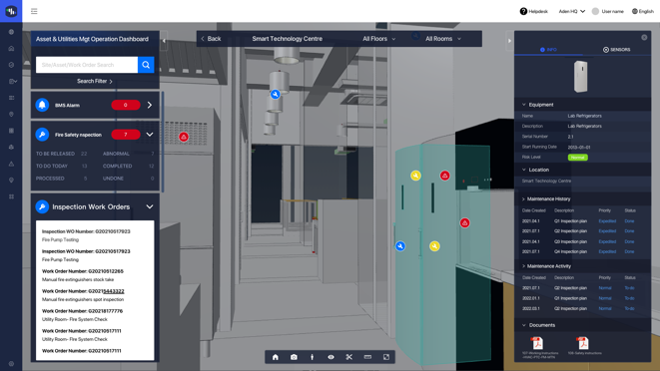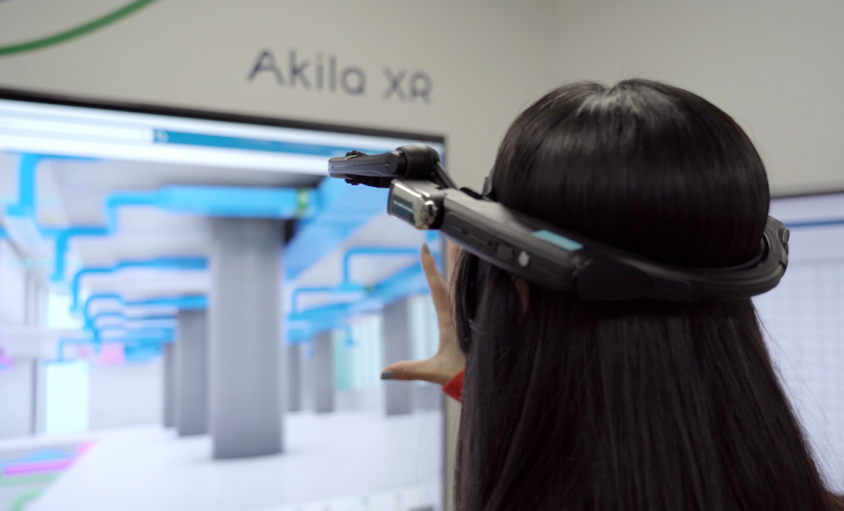Augmented/assisted reality technology is finding practical and beneficial applications in IFM, especially in maintenance.
Written by Guillaume Gimonet Aden Group’s Head of Technical Services Solutions.
Making strategic choices in operations and technology applications has been helping Aden tremendously to provide value to our clients, even under harsh conditions like the recent Shanghai lockdown. For many of the sites, the lockdown restrictions are still in place after two months, and this makes the case, once again, for resilience, creativity and strong tech integration facilitating remote team collaboration.
This challenge is a golden opportunity for Aden’s clients to fully appreciate the capabilities we build through our long in-house operation of remote site management, and a disciplined approach to maintenance plans execution and monitoring.
With 25 years of experience, Aden has leading expertise in the built environment and is anchoring the next big revolution in facility management with cutting-edge technologies. Aden’s technical asset management solutions now utilize Akila, the digital twin platform incubated by Aden Group which is at the core of our digital transformation.

AR is future-focused technology
We’re thinking beyond the traditional technical facility management, and new technologies are catalyzing the ways technical assets are maintained and managed. One of the technologies that in particular attracted the attention of our readers is AR (augmented/assisted reality). In an industry where even the most basic steps of digitalization are hardly implemented beyond glossy pictures in company brochures, how can such tools find their place in the IFM arsenal at Aden?
I found the remark extremely interesting. I have been toying with the topic for at least five good years, with many failed attempts on this tough journey. Between solutions providers overconfident in their offering, often overweighting the new product’s benefits, and actual professionals on the ground that must consider switching costs and are prone to status quo bias, the path to adopting AR technology is a bumpy one, riddled with irrational idiosyncrasies blended with real practical challenges to address.
At the onset of 2022 a couple of facts had to be recognized:
- The tech became significantly more reliable and robust than in pre-Covid times. The main issue that connectivity was is not as salient as before. New powerful algorithms used to process compression and picture stabilization are now mature enough to support work in real conditions.
- With rising expectations in compliance documentation, and the availability of cloud and digital twin technologies that are creating the right infrastructure to store and handle massive data, recording technicians’ work is becoming both easier and even incentivized. This is especially the case when the work is directly linked to health, environment, safety, security, or reputation.
Covid restrictions added the few incentives that tipped the balance towards the adoption of AR, with collaboration between remote teams (the benefit initially pushed forward by solutions providers, but our experience made us realize that it was secondary in FM business – relative to compliance) becoming a key thing.
As of today, we already identified a couple of practical cases where AR glasses have been useful to us – and valuable to our clients. The most recent case involves a client wishing to relocate a production line from one country to another. Since the relocation expert couldn’t travel physically from his office in Shanghai to the plant in Beijing to inspect the line, there was no way to even consider a quote. All the client’s plans were stuck.
At Aden though, we wouldn’t accept the status quo easily. We decided to ship our AR glasses to Beijing and let one of our engineers wear them and visit the site. The relocation experts have been able to guide the on-site engineer around the machines, and verify important details regarding surroundings, availability of cranes and other handling equipment, connections, and shape and form of the various equipment of the line. Two days later, we were able to provide a quote.
These quick wins are important as they are normalizing the technology, increasing the number of technicians and engineers familiar with it, and ultimately reducing behavioral switching costs while redefining the status quo.
In parallel, we’re now going a step further with inspections. For the most critical ones related to fire risk control, we are setting the stage for our technicians to wear the AR glasses and use the technology to record the inspection, while scanning QR codes displayed on site to link the digital records to the physical world in the facilities digital twin.
We’re pushing on this use case since it requires minimal disruption for the technician (we are already making QR codes-based inspections with the Akila App), and we have a strong justification for imposing the new tool – fire safety, which is a top concern for everyone. We are getting good results that are inviting us to explore further steps such as displaying asset health scores coming directly from the digital twin, creating incident notices that would be posted directly to the digital twin, or feeding-back information to the technician about task achievement.
Building a business metaverse
This effectively forms an IFM metaverse with persistent digital information being created and shared in context with the real world. Our clients can step in the shoes of our technicians when they execute critical inspections. Experts borrow the eyes of on-site engineers when they evaluate the size and shape of a large production line before relocation. Those experiences are not unlike a 4th Industrial Revolution version of the “Avatar” movie.
Focusing on value-oriented use cases touching on the topics of risk management, compliance, and increasing transparent conversations with our client on performance management, while crafting ways to make these transitions as painless as possible for our staff, we are making this new reality a daily habit, one practical use case at a time.
Stepping forward in the mission to provide transparent, efficient, and digitalized solutions for our clients, earlier this year, Akila has formalized a partnership with AMA, a world leader in AR wearable technology, to integrate AR as a powerful tool to assist in facility management. Aden engineers can equip with AMA ExpertEye glasses to perform inspection works and provide remote assistance.
